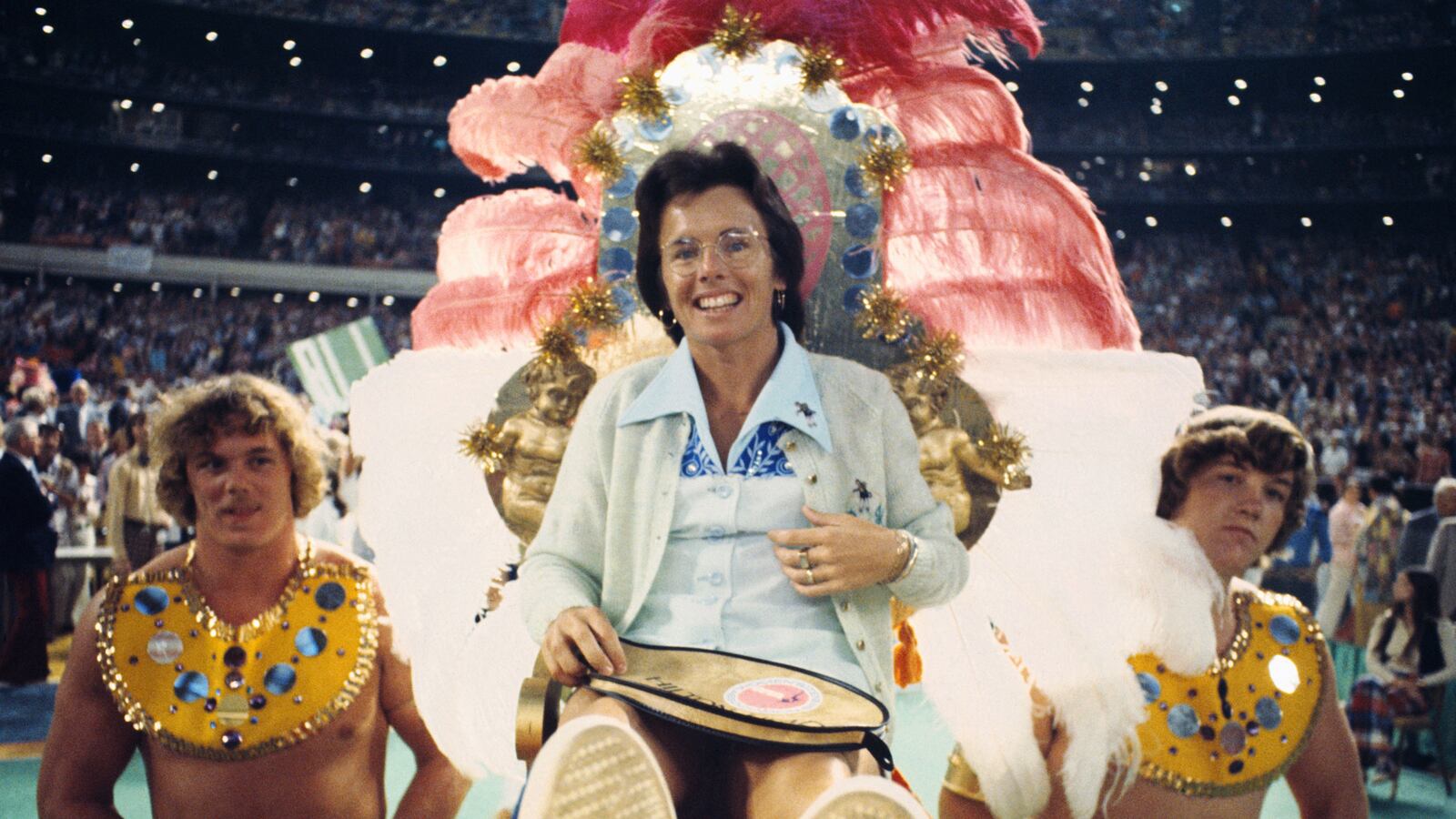You might know Larry Merchant best as the tough old bastard who didn’t back down from Floyd Mayweather in a post-fight interview, but before he became famous for talking about boxing on TV, Merchant was a crack sports columnist. He’s one of many talents featured in the entertaining new Library of America sports anthology, The Great American Sports Page: A Century of Classic Columns from Ring Lardner to Sally Jenkins (edited by John Schulian). Merchant was the sports editor at the Philadelphia Daily News in the ’50s and had a nose for writing talent. He put together one of the legendary sports departments and helped unleash a new wave of reporters, the so-called Chipmunks. Later, he took off with his own column, where he was hip, smart, and had a sense of humor. Here’s his 1973 look at that ’70s war of the sexes spectacle, the Billie Jean King thrashing of Bobby Riggs. —Alex Belth
All right, men, quit brooding and get to the dishes. Make sure the beds have hospital corners. And on the way to the supermarket why don’t you stop off at the doctor’s office for a little vasectomy? We’ve been the unfair sex for millennia. Last night we surrendered unconditionally.
Bobby Riggs, carrying the banner of male chauvinism, went down in flames.
Billie Jean King, carrying the banner of women’s liberation, shot him down.
In a once-in-a-lifetime promotion that would have made P. T. Barnum and Tex Rickard swoon, she-is-woman beat he-is-man in straight sets 6–4, 6–3, 6–3.
Before the largest audience ever to witness a tennis match, or a circus—30,472 in the Astrodome and many millions on television, in 36 countries—Billie Jean King reduced the oinking Bobby Riggs to a ham sandwich. She ate him up and picked her teeth with his racket.

Billie Jean King with Bobby Riggs. Riggs admits he is a male chauvinist pig as he gets ready for the 'Battle of the Sexes," on Sept. 20, at the Houston Astrodome.
Jim Garrett/NY Daily News via Getty“I said I was a 55-year-old man with one foot in the grave,” Riggs said. “It’s one and a half now.”
Billie Jean King was simply too good for Bobby Riggs. He had taken his magnificent “Battle of the Sexes” hustle as far as it could go—until it got to a woman who could play the game and not the stakes. A hustler is someone who isn’t intimidated by the stakes. That is a definition of a great athlete as well. Billie Jean King is a great athlete. She was raised in a competitive environment to do exactly what she did last night—be at her best when the money, a $100,000 jackpot and lots of commercial “fringies,” as she calls them, was on the table.
“There’s something in my psyche, my personality,” Billie Jean King said, “that gets me up for the main event.”
“Under the pressure and tension,” admitted Riggs, a legendary money player, “she did better than I did.”
Riggs knew it was a game on the second point, a textbook rally of lobs, volleys, drop shots, backhands, and forehands. Riggs hit enough good shots to win a set against the country club suckers who love to lose to him. But he lost the point to Billie Jean on some amazing recoveries. “Her quickness,” he said, “was too much for me.” And he wasn’t wearing galoshes or holding a dog on a leash or doing any of those exotic handicaps he dreams up for his hustles.
His only handicap was her. The only thing he beat her at was huckstering.
When they arrived at center court, she borne like an Egyptian queen, he wheeled in a rickshaw, as though it was a summit meeting of Cleopatra and Confucius, she could only sigh a “God!” at the hokeyness, but he rose to the occasion by remembering, “Where’s my Hai Karate after-shave?” She stripped off a blue sweatsuit and emerged resplendent in a pastel blue dress with rhinestones and sequins across the shoulders. He, shameless, wore a windbreaker with “Sugar Daddy” (a candy sponsor) emblazoned on the back. The two plugs were worth a reported $95,000 to him.

Billy Jean King raises her hands in triumph after defeating Bobby Riggs in the "Battle of the Sexes" Challenge Match at the Astrodome on September 20, 1973 in Houston, Texas.
Focus on Sport/GettyA couple of hours later Billie Jean King looked like she could run the Boston Marathon and Bobby Riggs looked like he had both feet in the grave. She toyed with him, like a daughter now tweaking her father’s cheek, now jabbing him in the ribs, now mussing his hair. His entourage of trainers and medicine men rubbed ice on his legs and arms and forehead as though he were a beaten fighter. What he was, was a tired old man.
“I feel this is the culmination of my career,” she said. “Ever since I was 11 years old and I couldn’t get in a tennis picture because I didn’t have a tennis dress, and I thought tennis was a game only for the rich and the white. I wanted to change the game.”
So the short and happy resurrection of Bobby Riggs comes to an end and the folk herohood of Billie Jean King begins. For his farewell he leaned over and nibbled on her ear.

From THE GREAT AMERICAN SPORTS PAGE: A Century of Classic Columns from Ring Lardner to Sally Jenkins, edited by John Schulian with a foreword by Charles P. Pierce, just published in hardcover and eBook by Library of America. Used by permission.






